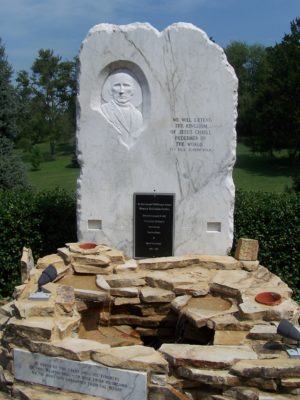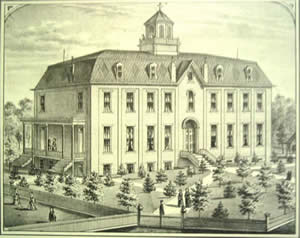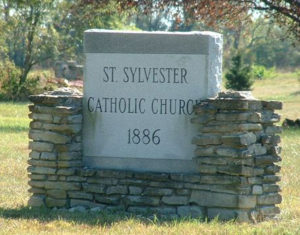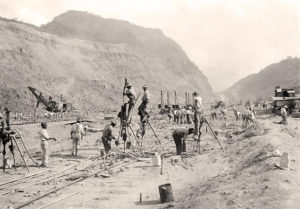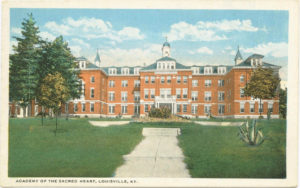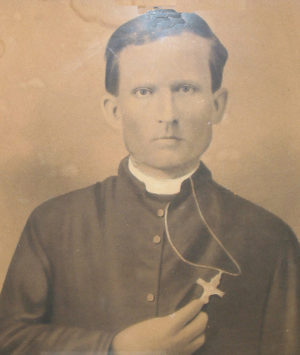
Young Fr. Paul Volk
Father Paul Joseph Volk, pioneer missionary of two continents, was named a saint by those who knew him personally. To those who heard about him, he was a legend of miracles and churches. Born in Germany on May 16, 1841, he was raised by his mother as his father died when he was young. He gave her credit for his vocation to the priesthood. Soon after his ordination on March 19, 1865, he decided to become a missionary in America, preparing himself by studying at the American College, Louvain, Belgium. In the summer of 1869, he arrived in Louisville where he served as assistant at Immaculate Conception Church. A year later, in 1870, he was appointed pastor of St. Alphonsus Church here in Daviess County where he stayed for 15 years. Here began his untiring efforts to lead people to God, motivated by an earnest desire to extend the Kingdom. Here he became that zealous pastor, that heroic missionary who never spared personal labor or sacrifice of any kind. His first task at St. Alphonsus was to rebuild the church which had burned prior to his arrival. He supervised the burning of the brick and personally helped toward the building.
Pastor at St. Alphonsus Church in rural Owensboro, Ky. Rebuilt church and St. Joseph Academy for Girls that had burned down.
His next project was the rebuilding of our Academy which had also burned. He collected donations, then acted as architect, contractor and laborer, in erecting the building which is still in use today as part of our boarding school. There is no doubt that Father Volk had a prophetic vision of the future. He spared nothing, not personal labor nor money, nor influence to raise this school and Motherhouse to the rank of first class. He always remained a true, faithful father who worked continually for the best interests of the Sisters and students. “Maple Mount”, so named because of the Maple trees that Father Volk planted on our front campus, were always “home” to him. While personally caring for sisters and students, Father Volk never neglected his other parishoners at St. St. Alphonsus and extended himself into neighboring localities – St. Raphael’s, Beech Grove, Calhoun, St. Joseph, Owensboro, and even into Henderson and Webster counties, building St. Benedict’s in Beech Grove and St. Sebastian, Calhoun, and organizing St. Joseph Parish, Owensboro. He travelled on foot and horseback. It was his way to go any place where people were unattended by a priest.
Sign for St. Sylvester Catholic Church in Ottenheim, Ky.
In 1885, he was called by his Bishop to parts of eastern Kentucky where there were German settlements needing the services of a priest. These included Lincoln and Boyle Counties and he even went into the Covington Diocese, Whitley and Laurel Counties. On the Tennessee Border, wherever his horse would take him, through wilderness and mountain area. Here he built seven churches in three years. Many stories are told of his work in Kentucky. One story that Father Volk told is about St. Sylvester’s Church at Ottenheim. This church was named for a Sylvester Johnson of New Haven whom he had met. Mr. Johnson made a promise to give him a check for $500.00 each time he would begin a new Church. “He kept his word; only once he remarked that I should not put them up so fast.” In 1888, Father Volk heard an appeal for priests in South America and obtained permission from his Bishop to respond. He was 47 at the time and had to teach himself Spanish in preparation for the work. He served first in Ecuador, and the Caribbean Islands, ministering to the Spanish and Indians in an area of 3,150 miles. He built seven Churches at this time, while enduring privations, hardships, sickness from malaria.
Panama Canal laborers
After a period of six years he was again called to serve in eastern Kentucky, at Danville, Lawrenceburg, Harrodsburg. After two years he was able to find a priest, a refugee from South America, to replace him, so he again obtained permission to return to South America, where he labored for 20 more years in the Islands and in Panama. This was at the time of the digging of the Panama Canal. The story is told that among the workmen, handling pick and shovel and carrying a hoe, there was noticed a very striking old man, very different from the rest. He was worn and thin, and the tropical sun had made him the color of the natives. He attracted attention because he was so different from the others. An investigation was made and it was found that he was a Catholic priest, that he was building a church up in the hills, and he was laboring to obtain funds to complete this church. The laborers were so struck by his example, that they “pitched in” and donated funds to complete the church. This priest was Father Volk.
Father Volk retired to become chaplain at Sacred Heart Academy in Louisville, Ky.
In 1915 due to broken health, he returned to Louisville and was made Chaplain of Ursuline Motherhouse. He described his life as Chaplain as one of easy tranquility after the hardships of his missionary labors. He endured this easy life for two years, then began to worry about it and approached his Bishop and asked for the most difficult mission in the diocese. Bishop O’Donaghue responded, “Why, Father, folks will murder me if I send an old man like you to the missions I have in mind, but if you insist, I will make you pastor at Peonia”. He was 76 when he went to Peonia in August 1917 where he served five missions and erected his last church at Annetta, KY. In the summer of 1919, he finally had to give up his work. The Bishop asked him to wait for a replacement. When this replacement did arrive, this veteran of the mission fields took one look at the newly ordained, absolutely inexperienced young priest and decided he had better stay a while longer, and he did. This young priest was Father John Dudine of Louisville. 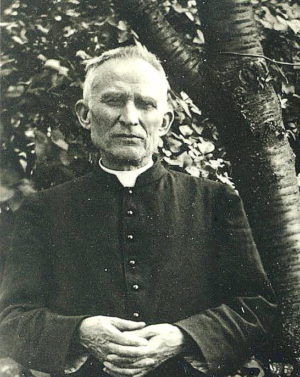
To those who knew him personally he was a saint. He is described as combination of his two patrons, St. Paul and St. Joseph; he had the fiery energy and the indomitable zeal of St. Paul and the fatherly kindness and simplicity of St. Joseph. He determined never to let personal interest interfere with the good he could do for others. The thought that carried him through many hardships was the certainty that so long as he did his duty “God would provide.” His life was one of continual self-sacrifice and poverty. He chose the poorest missions, saying, “the poorer they are, the better I like them.” It is told that he gave away his money, clothes, and the food that were given to him. On the occasion of his silver jubilee when he was given 75 silver dollars as a gift by the people of St. Alphonsus parish, he graciously thanked the donors and stated that since the money was now his, he could dispose of it at his pleasure. He therefore immediately gave it to the pastor to become the nucleus of the fund for a parochial school in St. Alphonsus Parish.
He had a great personal love for St. Joseph. Whenever he came across a different work to be done, he would just go ahead and trust to St. Joseph for the success of the undertaking. There was the man who after suffering a stroke was in a coma. When the priest came to anoint him, he awakened and received the sacraments. Then fell again into a coma and died shortly. 